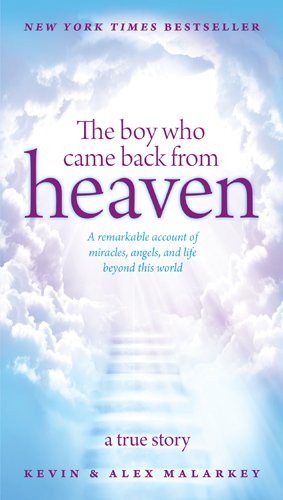Heaven Malarkey: Lifeway, Tyndale and The State Of Christian Publishing
 By now, most of us are pretty familiar with the Alex Malarkey Saga. A young boy went into a coma. Came out of the coma. Claimed to have died and gone to Heaven. His father Kevin wrote a book about it, listing Alex as co-author, and has made good money through promotion and sales revenues.
By now, most of us are pretty familiar with the Alex Malarkey Saga. A young boy went into a coma. Came out of the coma. Claimed to have died and gone to Heaven. His father Kevin wrote a book about it, listing Alex as co-author, and has made good money through promotion and sales revenues.
And then the controversy. Claims by the mother that young Alex isn’t seeing any of the royalties. Further claims that the story told in the book isn’t the real story. And this most recent allegation — by Alex himself — that the whole thing was a child’s lie, blown up into an industry. “I did not die,” said Alex in his open letter to Lifeway (a key distributor) and Tyndale House (the publisher). “I did not go to Heaven.”
Right on the heels of this letter come allegations by Beth Malarkey, Alex’s mom, that Tyndale knew all of this, and continued with publication anyway — and that Lifeway was made aware as well. Needless to say, both Tyndale House and Lifeway have some explaining to do.
Meanwhile, while Tyndale is now under fire for promoting what may be turning out to be a bald-faced lie, the entire Christian publishing industry has had its share of critics from both deeply conservative and more liberal mainstream segments of the author/audience population regarding the so-called “morality” aspects of published works. Indeed, just this week, author Mike Duran called out Christian review site The Christian Manifesto for single-starring what is generally considered a high-quality, well-crafted novel because of a few cuss words. The reviewer was surprised to find that these words had been accepted in a book published by a known Christian publisher — which, given criticism from the other side of the proverbial aisle, is a fair point.
Indeed the CBA — general shorthand for the entire Christian book publishing industry — has been long seen as so ridiculously restrictive in what they allow and do not allow in their books (some would call it whitewashing), that many Christian authors are ignoring the Christian book market, with all its demands for rose-colored, stained-glass reading, entirely and pushing out into the indie market, self-pubbing and going after secular readers.
This same tendency has been going on the music industry for years, with Christian musicians courting secular labels and airplay with vaguely “spiritual songs” and pop sensibilities. “We’re not a Christian band,” is the mantra. “We’re Christians in a band.”
I’m not a Christian Author. I’m a Christian who writes books.
And, indeed, one recently-heard justification for Tyndale follows a similar path: it’s a business, not a church. Their job is to make money.
Now, before I go any further, I want to say something: none of this is inherently bad. There is nothing wrong with wanting your work to reach a wider audience. There is nothing wrong with having a 0 JPM (that’s Jesus Per Minute in Christian Radio Land) pop song or a book that doesn’t climax in a teary-eyed conversion scene. There’s nothing wrong with making money.
Preachy songs are just bad art, preachy novels suck and, oh yeah, Christians gotta eat, too.
I’m in favor of Christian writers in the mainstream. I’m a fan of Christians writing Hollywood blockbusters and hit songs. You can’t change the world playing around in an insulated rubber room where the only people you ever talk to are just like you. You can’t do it.
But here’s where it gets sticky. Whether you’re a Christian band or a “Christian in a band;” whether you are writing CBA-approved Amish Romance or an independently published horror novel with a curse word tossed in every few pages; whether you are a Christian exec working for a secular publishing house or an exec at a Christian publishing house — the fact is, you represent something bigger and more important than what you do for a living.
In any Christian media industry, you ultimately hear the term “Christian plumber.” The idea being, of course, that a plumber is a plumber, and why should his faith have anything to do with it? Same with an author, or a musician, or, I suppose, a publisher. A job is a job. Faith is faith. Get it?
Turns out, his faith is important. It’s important because with that faith, whether you work in a specifically Christian market or not, you live to a higher standard. Not a standard some random blogger is assigning to you. Not the CBA-approved standard. But the standard that comes with being a child of God.
2 Corinthians 5:17 says if you are in Christ, you are “a new creation. The old has gone. The new is here!” A new creation! That means everything we do takes on a new significance. No longer is a plumber just a plumber. He is a new creation in Christ, and when he fixes drains, he fixes drains for Christ (Ephesians 6:5-8). This means he does business, not as a plumber, but as a Christian. He is fair in his pricing, and honest in his labor. He can be trusted in the homes of his clientele and in front of their children. If he fails in this, he may or may not fail as a plumber. But he does fail as a Christian.
1 Corinthians 10:31 reminds us that whatever we do, we are, in Him, to do it “for the glory of the Lord.” The work of our hands, our business decisions, our interactions with family and with others… all of it is meant to be for His glory.
So how does that work in the context of being a Christian in the media arts? Does that mean, in fact, that there must be a Come-To-Jesus on page 342 of every book penned by a Christian author? Does that mean a singer who knows Jesus can’t write a song about politics or about romance (without at least once “thanking God” for the lover in question)? Absolutely not. Does it mean that everything we do must be evangelical in nature? Once again, no. I see no evidence of that in Scripture.
It does mean we behave as Children of the living God. It means we treat one another with love and respect. It means we deal fairly with others in our business dealings, and work out issues that arise (and they will) with mutual grace, and always with an eye on His Kingdom. As for subject matter, it means we don’t glorify that which God finds abhorrent. It means we don’t celebrate lust or greed or selfishness. It means we strive for excellence in whatever we do. And yes, it means we are careful with the Truth.
Being a Christian means His Truth is all important. If you are a writer of fantasy fiction, this will mean writing the best fantasy you can, but with an ingrained nugget of God’s Truth and wisdom. It means if you’re in a band, your goal is not to get with that hot little groupie backstage. It means you’re not singing or writing or playing in a way that mocks God or His followers.
It means that, if you’re a publisher, you use a little discernment when it comes to whether or not you’re going to publish a dubious and potentially sacrilegious piece of saccharine Heavenly Tourism. It means the Bottom Line is also among the Bottom Priorities, and that the first and foremost is to glorify God. It means that, if you belong to a Christian publishing house, the potential for sales and merchandising is of far, far lesser import than the work of spreading His word. It means if you get a call and discover one of your authors may be being treated unfairly, you investigate and make it right. And if you get that call aaleging, even more importantly, that the claims in your supposedly true book are, in fact, false, your Faith dictates that you take action and you make it right.
It means your chief concern is not whether you can do something without being caught, but whether doing so meets the ethical and moral standards set by the Highest authority.
In short, being a Christian means you act like Christ, whether you’re a plumber, author, publisher, or Malarkey.









































Thank you for these thoughts, Randy. One hates to think that Tyndale and LifeWay simply saw a buck to be made from the cult following “heaven” stories have right now. But one also hates to think they had been roundly deceived. Either way, the answer is messy.
Here’s hoping they choose to do the right thing in cleaning this up. If that means the best thing to do is pull the book, I hope they have the guts to do it.
Becky — I believe they DID, in fact, pull the book. The main point of contention here is that they basically didn’t do ANYTHING until Alex and his mom went public. Once it was out in the open, it became, “oh, well, we want readers to know we have integrity, so we’re pulling this book and investigating.”
Where was the investigation BEFORE it went public? Integrity is what you do when nobody’s watching.
Randy,
I agree with you–mostly. I think that while Tyndale could have done more to investigate, Lifeway is getting shafted here. The source of their knowledge that the book was false came from a longtime critic who repeatedly emailed (and presumably still does email) Lifeway’s president regarding issues he has with what Lifeway produces. Given the source (and I’ve read the email) if I were Lifeway, I wouldn’t have investigated either.
It’s not that Lifeway didn’t want to make sure everything was legit–it’s that they, as a company so big that they have their own zip code, can’t verify everything all the time for total accuracy. They probably get 100 requests to remove or add content to their stores per week for a variety of reasons. If they spent time chasing down every last one, they’d be a Private Detective service instead of a publisher, albeit a Christian one.
And with Tyndale, Even if the son and the mom were saying that this was true, you can bet the dad was there the whole time telling Tyndale “Oh, it’s fine. They’re just nervous.” or whatever because he was making good money at it. Since the dad is the more experienced and cognitive of the two coauthors, why wouldn’t Tyndale listen to him?
For me, this is a witch hunt. Regardless of what your views are on heavenly tourism, I see a lot of jealousy in all of this. Not from everyone, but I personally get a bit jealous when someone is successful and I’m not. I think that for some of these critics, that’s the case, and so they’re content to use (very valid) reasons to tank this book and these publishers/distributors. Yes, the book should be pulled if it’s not true (or just moved across the store to the fiction aisle) but we ought to stop lambasting Tyndale and Lifeway. All we’re doing is looking for someone to direct our angst at, and it’s serving to make us look divided and stupid in the process to the rest of the world.
Those are my thoughts. Great article, Randy.
Ben, I know you’re NOT, but you -seem- to be saying a Christian bookstore needn’t take any kind of responsibility for what it sells. If it’s branded “Jesus,” that’s all the diligence due.
If LifeWay didn’t purport to be a ministry (and, by the way, they do), that might be somewhat different. But as a Christian organization that exists to
they have given themselves the responsibility to know what’s on their shelves.
Honestly, Randy, I think that as society drifts from God, so does His people. Jesus said in Matthew 24:12 that because of the rise of sin, the Love (Agape love, God love) will grow cold and in Luke 18:8 Jesus said But when the Son of Man returns, how many will he find on the earth who have faith?”
I think that we’ll only see less and less of God with some christian publishers and less in bookstores too. I also believe we will one day see ‘Christian Porn’. Some writers move closer and closer to the flame while waving the Christian flag and some publishers and bookstores want to follow society. Sad, huh? That’s where the Christ following Christian needs to plant their flag and say I won’t be moved. God will bless those works dedicated to Him, but not those who want to play games. It is what it is.
Given how reluctant some companies are to even show a couple experiencing sexual desire for each other within marriage, I think outright porn is a bit further away than that.
Oh i’ve read some christian stuff that made me think Harlequin books. ANd it was more than just marriage sexual desire. SMH. Trust me, it’s closer than you think.
But the very thing they’re doing is already flirting with biblical disaster. Jesus said that we can’t serve two masters, or he will love one and hate the other. Lifeway “serves” Mammon (money) and Jesus at the same time. So by definition they’re already violating a biblical principle by even attempting to serve both.
In any case, someone somewhere will have an issue with something on a Lifeway shelf at some point. Does that mean they should pull everything? Certainly not. They are “responsible” in upholding their own standards. They get to determine what does and doesn’t fall under those standards, don’t they? I’m not running Lifeway, so I can’t determine that for them.
Yes, I can complain and voice my concerns, but they get to make the decision. We get to make the decision whether or not we’re going to support them financially. That’s their motivation. Because if they don’t get our money, they won’t have bookstores to sell us stuff. Then there won’t be anything on the shelves, heresy or otherwise.
I feel like I should mention: LifeWay is by far NOT the only Christian retailer who needs take a serious look at what they’re selling. They just happen to be among the biggest, so they get all the press. CBD, Family Christian Bookstores, etc. all pretty much ALL guilty, one way or another, of pushing everything from bad doctrine to outright heresy on their bookshelves.
I’m not calling for a boycott or anything — Christians ought to get out of the boycott business and into the business of loving their neighbors. I am suggesting, lovingly, I hope, that these retailers take a serious look at their priorities, and make a decision as to whether some of this material lines up.
From what I’ve heard, it gets worse. Apparently Kevin keeps all the royalties and Alex hasn’t seen a red cent since his parents’ messy divorce. Alex has been wanting to retract for years, but it’s only now that he and his mother have finally gotten anyone’s attention that Tyndale and LifeWay are doing the PR patch-up song-and-dance.
Hey Randy!! Thanks for posting this. And that’s why I stay away from the bigger publishing houses and enjoy my little sweet publisher. It seems the bigger christian houses are now trying to bring in more work that they are now crossing their own beliefs, which in my opinion, is downright cheesy.
I’d rather have a publisher who sticks to their guns as opposed to wanting to follow society trends.
I also found this interesting: The reviewer was surprised to find that these words had been accepted in a book published by a known Christian publisher — which, given criticism from the other side of the proverbial aisle, is a fair point.
The bigger secular publishers frown on cursing in novels as they say it equates ‘lazy writing’. I don’t agree that it is lazy, but I avoid cursing b/c of my audience and how I feel about it. I’ve had to work hard and dig deeper to avoid it. It’s actually made me a better writer. Even Stephen King says to avoid it even though his books are filled with cursing. LOL!! Now the Christian publishers are allowing it, while the bigger secular publishers say, really?? LOL!! Oh my. The things these Christian publishers do to be invited to the ball.
I wonder if Tyndale is so desperate to bring in the business that they’ll print anything, which is sad. I fear that the christian publishers are being a lot like society and dropping their Christian standards in order to ‘fit in’. That’s just plain sad. God doesn’t play games, but too many people think He does or that He won’t care what they do.
Oh well, not my circus, not my monkey. 🙂